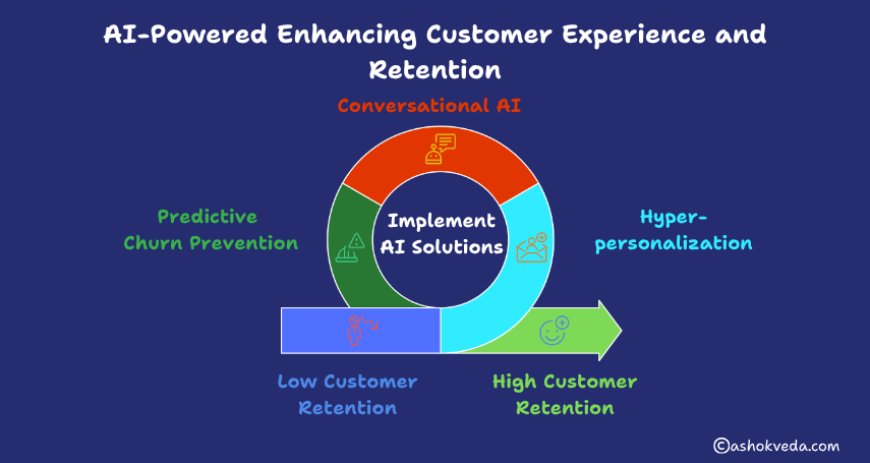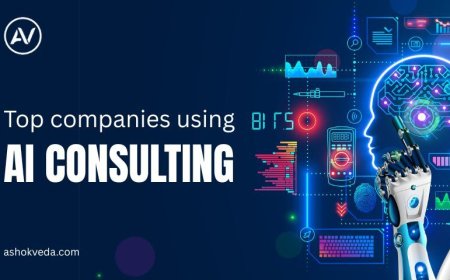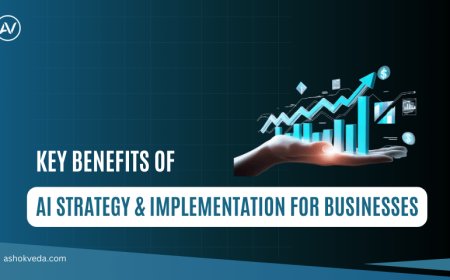Top 10 Benefits of AI for Startups
Discover the top benefits of AI for startups in 2025. Learn how AI can accelerate growth, improve efficiency, enhance customer experience, and give your startup a competitive edge.

We have never seen a corporate environment like the one that exists in 2025. Artificial Intelligence (AI) is becoming the foundation of innovation for startups worldwide, no longer a tool for experimentation used just by big giants. Recent industry reports reveal that over 80% of startups are actively integrating AI into at least one aspect of their operations, from product development to marketing, operations, and customer support. Meanwhile, global investment in AI-powered startups reached $90 billion in 2024 alone, and projections indicate a continued surge in AI adoption across industries.
For startups, this is a golden era: AI is not just a competitive edge; it is a potential growth multiplier that can accelerate product-market fit, optimize resources, enhance customer experiences, and unlock new revenue streams. However, leveraging AI effectively requires more than just plugging in a few tools. In this article, we’ll dive deep into the benefits of AI for startups, offering actionable insights for founders ready to harness AI as a strategic growth lever.
Benefits of AI for Startups:
1. Accelerating Product-Market Fit Through Smart Experimentation
Startups thrive on speed and adaptability. AI enables founders to iterate faster and make smarter decisions by:
-
Automated A/B testing: AI-driven testing platforms can dynamically optimize variations, reallocate traffic to winning options, and provide insights faster than traditional experimentation.
-
Personalized onboarding: AI can design adaptive onboarding flows tailored to each user’s behavior, maximizing activation and early engagement.
-
Predictive insights from limited data: Modern AI techniques like few-shot learning allow startups to extract meaningful patterns even from small datasets, overcoming the early-stage data scarcity problem.
Impact: Faster validation of hypotheses, reduced wasted effort, and a shorter path to scalable growth.
2. Optimizing Costs and Operational Efficiency
One of the clearest benefits of AI for startups is improved efficiency and cost reduction. AI allows small teams to achieve what previously required far more manpower:
-
Task automation: From customer support to bookkeeping, AI can handle repetitive work, freeing founders and employees for high-value activities.
-
Predictive marketing spend: AI can identify high-value audiences, optimizing ad spend to reduce customer acquisition costs (CAC).
-
Operational insights: Inventory management, pricing strategies, and workflow optimization can be enhanced using AI-powered predictive models.
Result: Startups can stretch limited capital further, improving unit economics and increasing the runway available for experimentation and growth.
3. Enhancing Customer Experience and Retention
Customer experience is a decisive factor for startup survival. AI can transform the way startups engage and retain users:
-
Hyper-personalization: AI analyzes user behavior to deliver tailored content, offers, and recommendations, increasing satisfaction and loyalty.
-
Conversational AI: Chatbots and virtual assistants can handle complex multi-turn queries, improving responsiveness and freeing human agents for strategic tasks.
-
Predictive churn prevention: AI identifies at-risk users before they leave, enabling proactive retention campaigns customized for individual behaviors.
Outcome: Stronger customer loyalty, higher lifetime value (LTV), and improved referral potential.

4. Driving Smarter Growth with Data-Driven Marketing and Sales
AI is revolutionizing marketing and sales, transforming intuition into measurable results:
-
Lead scoring: AI models prioritize leads based on conversion probability, enabling sales teams to focus on high-value prospects.
-
Creative optimization: Generative AI can produce ad copy, visuals, and marketing content at scale, while predictive systems identify the most effective variants.
-
Attribution modeling: AI can determine the true ROI of campaigns across multiple touchpoints, helping startups allocate budgets more effectively.
Benefit: Startups can scale marketing efforts confidently while minimizing wasted spend and maximizing revenue.
5. Accelerating Product Development and Engineering Productivity
AI isn’t just for marketing; it also accelerates development and product innovation:
-
AI-assisted coding: Tools can generate boilerplate code, suggest improvements, and identify potential bugs, speeding up development cycles.
-
Automated testing: AI can triage failures, suggest fixes, and create synthetic test data, reducing QA bottlenecks.
-
Design assistance: AI tools can generate wireframes, visual mockups, and UX prototypes, allowing faster iteration.
Impact: Faster product launches, reduced development costs, and improved engineering output.
6. Enabling Competitive Differentiation
AI can help startups stand out in crowded markets:
-
Hyper-personalized SaaS features: Products that adapt to user behavior create a unique experience that competitors struggle to replicate.
-
New vertical AI apps: Specialized AI solutions in healthtech, edtech, and fintech open opportunities that were previously impossible.
-
Embedded intelligence: Startups can offer smarter versions of traditional products, creating higher perceived value and defensibility.
Benefit: AI becomes both a differentiator and a signal of ambition for investors and customers alike.
7. Data-Driven Decision Making
Startups face uncertainty at every turn. AI transforms data into actionable insights:
-
Demand forecasting: Helps manage cash flow and inventory with higher accuracy.
-
Customer lifetime value prediction: Enables smarter budgeting and acquisition decisions.
-
Scenario analysis: AI-powered simulations help founders evaluate strategic choices and risks.
Result: Decision-making becomes more predictable, measured, and strategic.
8. Maximizing Talent and Team Productivity
Hiring is challenging and expensive for early-stage startups. AI amplifies team output:
-
Skill augmentation: AI allows junior team members to produce work at a senior level.
-
Knowledge transfer: AI-powered internal knowledge bases shorten ramp-up times for new hires.
-
Reduced outsourcing dependency: Content creation, analytics, and repetitive tasks can be internalized, reducing reliance on external vendors.
Impact: Small teams can operate at the scale of much larger organizations.
9. Scaling Operations Smoothly
Operational complexity grows as startups expand. AI helps manage this growth:
-
Automated workflows: Onboarding, ticketing, and communications scale without adding headcount.
-
Resource optimization: Cloud computing costs, scheduling, and supply chain logistics can be optimized in real time.
-
Fraud and risk detection: Protects revenue and reputation while scaling.
Outcome: Startups can scale confidently without operational chaos.
10. Accessing Ecosystems and Strategic Partnerships
AI adoption often opens doors to new ecosystems:
-
Cloud providers and AI platforms offer startup credits and integration support.
-
Partnerships with data providers, tech platforms, and domain experts become easier with AI-enhanced products.
-
API-based AI services reduce the need for in-house model development, speeding up time-to-market.
Benefit: Faster execution, reduced development costs, and new partnership opportunities.
Practical Roadmap for AI Integration in Startups
To fully realize the Benefits of AI for Startups, founders should follow a structured approach:
-
Identify high-impact use cases: Focus on areas that directly affect growth or efficiency.
-
Invest in data infrastructure: Ensure clean, centralized, and structured data.
-
Use composable AI: Leverage APIs and pre-trained models to reduce development time.
-
Measure outcomes: Track key business KPIs, not just AI model metrics.
-
Prioritize ethics and compliance: Respect privacy, monitor bias, and ensure safety.
-
Maintain human oversight: Keep humans in the loop for critical decisions to retain trust.
Mitigating AI Risks
AI comes with challenges that startups must manage:
-
Bias and fairness: Regularly audit data and outputs.
-
Overreliance on third-party models: Monitor drift and have fallback strategies.
-
Regulatory compliance: Stay updated on local and international regulations.
-
Data security: Encrypt sensitive data and control access rigorously.
Proper risk management ensures AI benefits are sustainable and trustworthy.
The Benefits of AI for Startups are extensive: faster product-market fit, operational efficiency, enhanced customer experiences, smarter growth, better decision-making, and competitive differentiation. In 2025, startups that adopt AI thoughtfully gain a measurable edge — and those that ignore it risk falling behind. AI is not a magic wand, but when integrated responsibly, it acts as a powerful multiplier, helping founders scale smarter, faster, and more strategically. Startups that start small, iterate fast, and invest in data and processes can transform AI from a buzzword into a true growth engine — and in today’s market, that’s the ultimate competitive advantage.





































